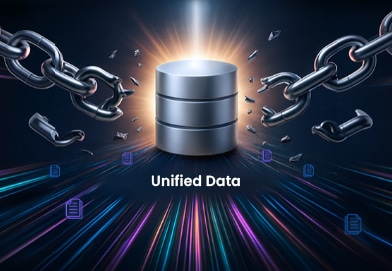Data-Sleek founder and CEO, Franck Leveneur made a guest appearance alongside Couchbase CMO, John Kreisa on DM Radio’s Really Real-Time Data hosted by Eric Kavanagh. During the interview, Leveneur, Kavanagh, and Kreisa discussed the importance of data management, the role of real-time data, and the future of AI in business.
In this bonus segment, the guests discuss the future of AI in enterprise organizations. Kavanagh envisions companies implementing their own AI language models on-premises, trained on proprietary data, to provide executives with actionable insights.
Leveneur supports this idea, noting the trend of centralizing data for analytics and extending it with AI to enhance business operations. He draws parallels to the development of intranets and B2B networks. Leveneur predicts a similar evolution for AI within companies. Technologies like Apple’s Vision Pro could facilitate AI interactions and improve productivity.
Kreisa agrees with these comments, highlighting the efficiency gains and potential changes in knowledgeable worker roles due to AI integration. The discussion concludes by emphasizing the transformative impact of AI on business practices.

Key Takeaways
- Kavanagh predicts enterprises in the future will create their own intranet that will be an essential part of daily operations.
- Leveneur predicts that Vision Pro will be the gateway to the transition from virtual to digital assistants.
- Kreisa predicts the evolution will lead to both the addition–and elimination–of enterprise hierarchy.
Really Real-Time Data Interview: Segment 4
Host: Eric Kavanagh
Guests: Franck Leveneur (Founder, Data-Sleek), John Kreisa (CMO, Couchbase)
Broadcasted May 23, 2024
Find the full podcast on DM-Radio.Biz Here.
Read Part 1 of this interview:
Read Part 2 of this interview:
Read Part 3 of this interview:
Final Thoughts: Building an Intranet with AI Frameworks
Eric Kavanagh: All right folks back here on DM radio. Time for the podcast bonus segment with Franck Leveneur from Data-Sleek and John Kreisa from Couchbase. I’m going throw both of you, Franck you first and then John, just comment on this.

Here’s my big idea. I wrote about this on LinkedIn a couple of weeks ago, actually, when I was heading to the Boomi Conference. I’m just thinking about all this stuff and what Franck just mentioned in the break here, which is privacy, PII, IP intellectual property, and using these engines. It’s like you want to be careful about that.
Here’s my theory of what’s going to happen, at least for any number of very forward-looking organizations that have the wherewithal to do this. I think that companies are going to instantiate their own small language model on Prem in their environment behind their firewall, so they own it, they run it, and it’s in their space.
Then, they’re going to train it on their ERP data, CRM data, Salesforce data, customer service data, and all sorts of other things. If they have Splunk, whatever they have, they’re going to train it on their information assets.
Then, the executives are going to have this snazzy UI, which is a national language interface. They’re going to sit there and ask questions all day long. “How is our marketing doing in the West Coast?”, “Are we on plan right now?”, “What can we do?”, “Who do we need to hire?”, “Where are there gaps in the organization?”
They’re just going to get all kinds of information trained on their corporate data. Now, I’ve heard a couple of people say, “Yeah, I don’t think there’s going to be enough data to do that. I’m not so sure about that.” I think that is the future, but what do you think about that, Franck?
Change is Happening Now: Evolving from B2C to B2B
Franck Leveneur: No, I think there’s enough. Businesses use so many SAS services. That data needs to be centralized somewhere to do analytics and reporting.
The same thing is going to happen. They’re just going to extend it and plug AI in it, that can understand numbers. Tracking H.R. is the software. You have the names of the people, what they do, when they were hired, how long they’ve been working, and what they specialize in. You have their resumes, and you put that into a centralized database, and then you plug in AI.
I think this is a natural behavior. If you look at the internet, at the beginning, it was B2C, and then people started building intranets—internal Networks totally isolated from the public. You have your own network inside the company. And then you add B2B after that. You work with partners and people you give access to, and they can access your data. I think AI is going to be the same thing.
Right now we are in a B2C mode. They are exposing that to as many people as possible and getting feedback. However, businesses are going to build their own customized AI using open source. And now there’s one from France actually called Mistral AI, which is a mixture.
Eric Kavanagh: Yeah.
Vision Pro’s Potential in Enterprise Application
Franck Leveneur: Yeah, they are doing pretty well. So, all those open-source models are going to be brought into the enterprise. They’re going to build those models and, as you said, plug into all the database engines, query, and build knowledge. And then after that, you talk to them, and that’s it.

I want to talk also about something. I know we don’t pay too much attention. I know a lot of analysts are talking about Apple Vision Pro being too expensive and having no future. I’ve always believed in Apple because they are smart people who do a lot of research. I think this is just the beginning.
The model is called Vision Pro, so it’s professional, right? That’s why it’s expensive. It’s already used in medicine, and doctors are using it. This is going to become the interface because AI is better at interacting with voice. (watch this Youtube video about Matthew Berman reviewing Apple Intelligence.
Why do you? Because it can understand your language. You can even translate in different languages. So having Vision Pro right on your face, you can talk to it and say “Hey I want to see this, can you pull this report?” “Hey, what do you think about that?” And then those things are going to come up on your screen. You can say, “Can you enlarge this? I want to see this. Oh I don’t understand that, what does that mean?”
It’s going to be a full interaction and you can FaceTime or interact before other people. You can send this report to this person. That goes back to where we were. We’re going to be more productive and accelerate. Basically, the technology and people who are using the least and already are the ones who are going to really perform well.
Turning Real-Time Data Into A Virtual Assistant
Eric Kavanagh: Yeah I think that’s exactly right, and John I’ll throw it over to you. Not only will you ask it, say “Give me a report on all of the on the efficacy of our marketing campaigns in the Northeast,” and then you get this information.
Say “Okay,” and then you tell it, “Please set up a meeting with all my senior VPs sometime next week to discuss this and give them a few charts to look at,” [and hit] enter. Then the system goes and finds, okay, everyone’s available on this date. It sets up the meeting, sends you the invite, gets you the reports.
Compare that to how business has been done traditionally. It’s just crazy. You want to talk about real-time data. It’s going to change how we work, but make us a lot more productive. I think. Real quick what do you think?
Private models Lead to Greater Efficiency
John Kreisa: Yeah just just as you said. Knowledge workers are in the bullseye in acceleration and improvement in efficiency. Probably some elimination, too, depending on the role. I think it’s squarely in the bullseye of these AIs. I agree, they’ll be private models where the data is being created as a window to share and enterprises will be more efficient. There’s no doubt about it. Yeah it’s good stuff.
Eric Kavanagh: Well look these gentlemen up online folks. John Kreisa Couchbase and Frank Leveneur of Data-Sleek. Send me an email if you want to be in this show info@DM-radio.biz. We’ll talk to you next time folks. You’ve been listening to DMradio
This interview has been edited lightly for clarity.
Find the full podcast on DM-Radio.Biz Here.
Jump to Part 1 of this interview:
Jump to Part 2 of this interview:
Jump to Part 3 of this interview:
Want to host Data-Sleek on your next podcast? Contact us for our speaker sheet and to set up an appointment.
And if you need any consulting about real time analytics, don’t hesitate to schedule a free consultation with us.







